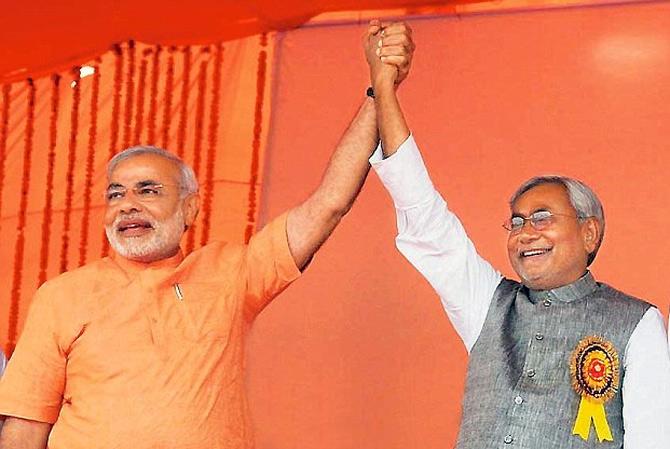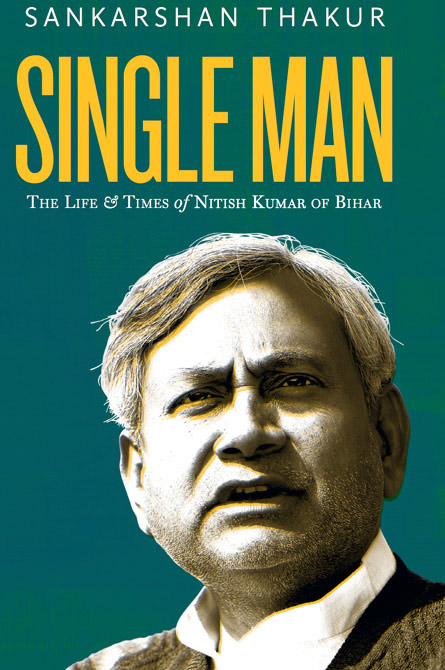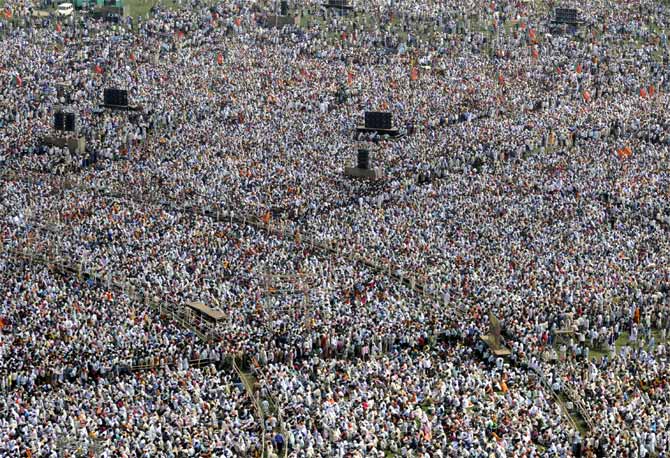Sankarshan Thakur
'When the morning's papers were brought to Nitish Kumar the next day, what he saw left him so irate he couldn't hold his cup of tea straight. Full-page advertisements had appeared in two of Patna's largest circulated Hindi dailies -- Jagran and Hindustan -- thanking Narendra Modi for the Rs 5 crore flood relief money...'
'The text on it was irrelevant, it was the subtext that burned into Nitish -- the Ludhiana photograph leapt off the page: there it was again, Narendra Modi and Nitish Kumar, palms clutched and held aloft.'
'Nitish thought it a distasteful and offensive taunt; worse than a rude joke, a makhaul, mockery...'
A fascinating excerpt from Sankarshan Thakur's new book, Single Man, The Life & Times of Nitish Kumar of Bihar, Harper Collins India.
In June 2010, a few days before the BJP's national executive was to meet in Patna, posters began to appear on the city's walls thanking Narendra Modi for his mahadaan, noble donation, towards relief for Kosi flood victims: a sum of Rs 5 crore.
On the eve of the session, giant hoardings went up on Patna's vantage crossroads proclaiming Modi's largesse and expressing gratitude to the Gujarat chief minister on behalf of the people of Bihar.
Many of these were sponsored by lesser lights of the local BJP unit, men like Rameshwar Chaurasia and Nitin Navin. Modi was arriving in Bihar for the first time in many years, he had won successive elections in Gujarat, he was being feted by his partymen. Excitement eddied around him.
Nitish was not in Patna when the BJP session began, he was in north Bihar on a leg of his Vikas Yatra, laying the ground for assembly elections that were scheduled within months. He was returning, though; he had assured Sushil Modi (then the BJP deputy chief minister) he would host a dinner for BJP leaders before they left Patna.
Sushil Modi had suggested Chanakya Hotel, where many BJP leaders were staying. Nitish said no, he would call them all home for a meal, hotels are impersonal. A shamiana had been erected on the lawns of 1 Aney Marg; the kitchen rigged at the back had been given a list of sweetmeats typical to Bihar -- balushahi, belgrami, khaja, fine-flour wafers; and, of course, there would be litti and chokha.
B D Singh, the energetic Maurya Hotel factotum, had been handed turnkey charge of a five-star menu and service, the chief minister himself would tick the boxes on preparations once he arrived back in Patna.
Invitation cards were printed, individually addressed to each member of the BJP national executive and state leaders. The evening before the dinner, they were handed to Shyam Jaju, an old BJP hand who supervised the party headquarters in Delhi, for distribution.
When the morning's papers were brought to Nitish the next day, what he saw left him so irate he couldn't hold his cup of tea straight. Full-page advertisements had appeared in two of Patna's largest circulated Hindi dailies -- Jagran and Hindustan -- thanking Narendra Modi for the Rs 5 crore flood relief money. The sponsors were a hitherto unknown set that called themselves 'Friends of Bihar'. The issuing agency was the Patna-based Expression Ads owned by a PR conduit called Arindam Guha, well-known to both media and government circles. None of those filters could mask the author of the ad.
You can buy your copy of Sankarshan Thakur's Single Man, The Life & Times of Nitish Kumar of Bihar at Rediff Books!
Kindly ...
When Nitish Kumar cancelled the Modi dinner
Sankarshan Thakur
A fascinating excerpt from Sankarshan Thakur's new book, Single Man, The Life & Times of Nitish Kumar of Bihar, Harper Collins India.
The text on it was irrelevant, it was the subtext that burned into Nitish -- the Ludhiana photograph leapt off the page: there it was again, Narendra Modi and Nitish Kumar, palms clutched and held aloft.
Nitish thought it a distasteful and offensive taunt; worse than a rude joke, a makhaul, mockery. Narendra Modi had come to Patna, and in one go, twice violated him. He had paid to have a photograph published that Nitish was hustled into and which he wanted deleted from the memory boards. He had made to belittle Bihar by publicising his relief contribution as a favour done.
About the first thing Nitish did on recovering from his rage was call Sanjay Jha (the former BJP legislator who joined the Janata Dal-United in 2012). The dinner won't happen, recall the invitations. Nitish's tone told Sanjay Jha it was no time to argue or reason. The chief minister also instructed his home staff to have the shamiana pulled down and the kitchen put out.
Sushil Modi learnt Nitish had scrapped the dinner with the BJP executive still in session. He wasn't surprised, having seen and remarked upon the newspaper advertisement himself. His worst fears were taking shape, a showdown between the alliance partners just months short of the elections.
He had, in fact, advised party leaders not to hold the session in Patna, he didn't want to be dealing with intra-alliance irritants when the focus was on the approaching polls.
The BJP leadership had settled on Patna for quite the same reason -- a session ahead of elections would serve to galvanise party cadres. Sushil Modi tried reasoning with Nitish through intermediaries, but in vain. Galat message chala jaayega chunav ke pehle, he argued, this will send out a wrong message before elections.
The deputy chief minister knew he would fetch no quarter. He knew his boss to be a stubborn man, and now that he had taken a position, he wouldn’t give. Nitish was curt and unmoved. 'Galat message chala gaya hai, aap logon ne bheja hai, meri jaankari ke bina yeh sab chhapa kaise?... (The wrong message has already gone out and you people have sent it. How did this get published without my knowledge?)'
You can buy your copy of Sankarshan Thakur's Single Man, The Life & Times of Nitish Kumar of Bihar at Rediff Books!
Kindly ...
When Nitish Kumar cancelled the Modi dinner
Image: A rally addressed by Narendra Modi in Patna in September 2013.Photographs: Krishna Murari Kishan/ Reuters Sankarshan Thakur
A fascinating excerpt from Sankarshan Thakur's new book, Single Man, The Life & Times of Nitish Kumar of Bihar, Harper Collins India.
That afternoon Nitish had invited journalists who had arrived from Delhi to cover the BJP session to a casual interaction over lunch at the Chanakya Hotel. He came visibly upset and told his guests he had withdrawn the dinner invitation to BJP leaders and was seeking an inquiry into how the advertisement was published. 'Serious maamla hai, iski tehkikaat hogi (It is a serious issue, it will be probed)'.
Beyond the political immorality Nitish saw in it, there was also a case, if thin, for legal violations. No paid-for material that carried a photograph of the chief minister was meant to be published without the approval of the government's information department.
Rakesh Dubey, a mid-level police officer, was asked to investigate the paper trail of the ad. His mission took him as far as Surat, but the tracks had been efficiently covered. Dubey gathered that among the backers of Friends of Bihar, an outfit never heard of before or since, was the BJP MP from Navsari, C R Patil, and that a sum of Rs 30 lakhs had been paid, through Expression Ads, as fees.
At this point, Nitish was reconciled to breaking with the BJP. He told confidants to be prepared to strike out on their own in the elections. Gloom had descended on the BJP camp; many top leaders, including then party chief Nitin Gadkari, L K Advani and Arun Jaitley, sensed Narendra Modi had caused unnecessary provocation, jolted the alliance. It wasn't good news. They had lost to the Congress at the Centre a second successive time in 2009. Narendra Modi's public sneer could rob them of another key state.
But Narendra Modi could not understand what the fuss over the advertisement was all about. He grumbled about Nitish's bad manners -- how rude and uncultured of him to withdraw a dinner invitation, he ranted to his set of loyalists that night, and why should I not be welcome in an NDA-ruled state? It is time these questions are asked.
When he addressed a party rally at the Gandhi Maidan the next afternoon, he rubbed the Gujarat-Bihar comparison in -- 'You folks in Bihar are just about emerging from the ditch you have been in. Come to Gujarat and see what a prosperous place we have created there.' He was putting Nitish down. He concluded his speech without naming him.
For the next few days it seemed a parting of ways was imminent. Nitish announced he had sent back the Rs 5 crore cheque to Gujarat; rebuffed, the BJP leadership reacted: it wasn't a personal cheque for Nitish, Gadkari countered in a meeting with JD-U president Sharad Yadav in Delhi, it was meant for the people of Bihar, Nitish is insulting us.
Sharad Yadav was grim and silent, he hadn't the authority to speak on Nitish's behalf. He only informed the BJP chief calmly that his indignation may be a little misplaced because from what he knew, the Gujarat government had cashed the spurned cheque into its account the day it arrived back.
Excerpted with permission from Sankarshan Thakur's Single Man, The Life & Times of Nitish Kumar of Bihar. Harper Collins India. Pages: 309. Rs 599.
You can buy your copy of Sankarshan Thakur's Single Man, The Life & Times of Nitish Kumar of Bihar at Rediff Books!




article